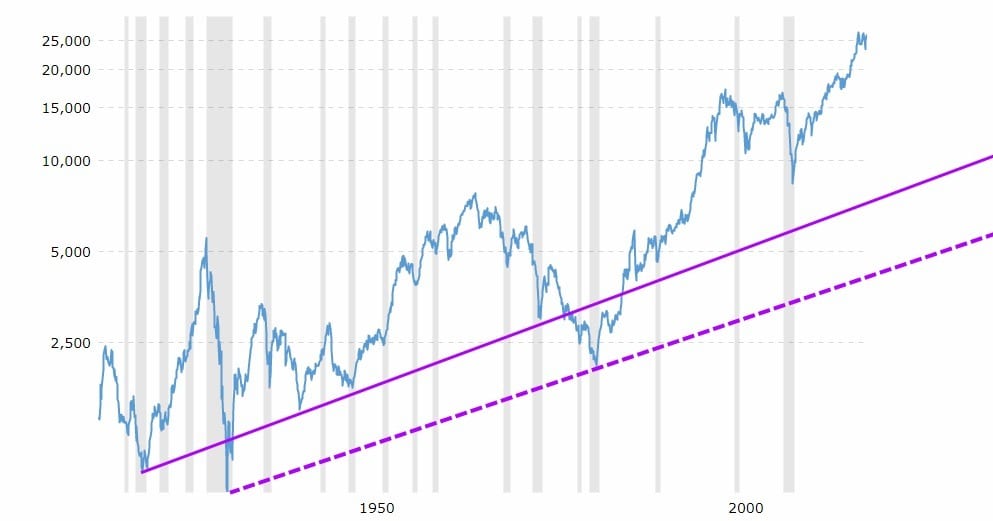
Dow Jones Prediction: Soar or Sag?
Oct 6, 2024
Let’s start with an excerpt from one of our recent market updates. Essentially, the masses won’t be celebrating until they reach a state of euphoria, indicated by several of our metrics entering the Euphoria zone. For instance, bullish sentiment must surge to 60 and stay at or above 55 for several weeks. Additionally, our Anxiety Index should reflect total greed. Until these conditions are met, the markets are unlikely to crash, barring a black swan event. Therefore, all sharp pullbacks should be embraced.
Among all the major indices, the RUT appears to be the least overbought. However, it still needs to release some pressure and dip towards the oversold zone on the weekly charts. Therefore, trading the major indices via ETFs or futures at this juncture might not offer the most favourable risk-to-reward ratio. A weekly close below 1900 could potentially trigger a swift downward movement. The severity of the correction will hinge on how quickly investor sentiment shifts towards the bearish or neutral camp. Nevertheless, as we’ve emphasised numerous times before, the correction is unlikely to be exceptionally sharp, given the absence of robust and consistent bullish readings. Market Update April 3, 2024
The RUT (Russell 2000 Index) continues to stay strong above the 1900 level, even after the market released some pressure on Thursday. While many focus on nominal numbers, the recent downward move didn’t amount to much in terms of percentage change. To put things in perspective, the Dow would need to plummet by at least 4,000 points to qualify as a standard correction.
Our previous outlook still holds: if the RUT closes below 1900 for the week, it would be seen as a positive development, likely leading to a quick and significant pullback. Since bullish sentiment hasn’t gone above 55 for several weeks, this retreat would trigger a noticeable increase in bearish sentiment, creating a great buying opportunity. Market Update May 27, 2024
The trend is your friend; the rest is just noise.
It takes a special kind of stupidity to be a Permabear, the one that even a thousand hard slaps will not alter. Perma-Bears have a death wish; they beg to be taken to the cleaners for nothing else can explain this short-sighted thinking. Sol Palha
The trend is your friend, a wise companion who whispers insights amidst the chaotic noise of the market. To defy this friendship is to embrace financial folly, a path chosen by the stubbornly pessimistic Perma-Bears. Their mindset reflects a unique brand of stupidity, as Mark Twain’s wit might describe it, for they ignore the lessons of history and human nature.
The renowned political strategist Machiavelli cautioned against such rigid thinking, stating, “The first method for estimating the intelligence of a ruler is to look at the men he has around him.” With their bearish myopia, Perma-Bears isolate themselves from the crowd’s wisdom, ignoring the market’s very pulse.
The great investor John C. Bogle echoed a similar sentiment, emphasizing the importance of embracing the trend, “Don’t look for the needle in the haystack. Just buy the haystack!” Perma-Bears, however, insist on searching for that elusive needle, ignoring the bounty that lies within the haystack of bullish opportunities.
The German merchant Jacob Fugger, whose financial prowess shaped Renaissance Europe, understood the folly of defying market trends, “I would rather have a small share of something valuable than a large share of nothing.” With their bearish bias, Perma-Bears gamble with their financial futures, risking it all for the elusive satisfaction of being proven right in a bull market.
From a mass psychology perspective, the adage, “The trend is your friend,” takes on a profound significance. It reflects the crowd’s collective wisdom, the market’s very pulse. Perma-Bears, in their contrarian stance, isolate themselves from this collective intelligence. They are like swimmers fighting against the tide, destined to exhaust themselves in a futile struggle.
The stubbornness of Perma-Bears is akin to a self-imposed death wish in the financial arena. Despite the overwhelming historical evidence to the contrary, their insistence on bearishness is a curious form of financial masochism. It is as if they seek financial hardship, inviting the market to punish their short-sighted thinking.
As the long-term charts vividly illustrate, the trend is a powerful force that shapes the financial landscape. To defy it is to invite financial ruin, a fate that Perma-Bears seem all too willing to embrace. Their mindset is a curious anomaly, a psychological puzzle that fascinates and bewilders in equal measure.
In the words of Machiavelli, “A wise man adapts himself to circumstances, as water shapes itself to the vessel that contains it.” With their rigid bearishness, Perma-Bears are like water refusing to flow, destined to be left behind as the markets surge. The trend is indeed your friend and those who ignore this friendship do so at their peril.
One can see that from a long-term perspective, firm corrections or crashes are nothing but buying opportunities in disguise. Buy when blood flows freely on the streets and run for your life when the herd turns euphoric.
Dow Jones Prediction: Ready for Takeoff in 2023?
It takes no effort to panic, which is why there is no reward, but it takes effort to remain calm in the face of panic, which is why the rewards are usually very high. Mass Psychology demonstrates that one should never follow the herd as they always do the wrong thing at the right time.
If the market pulls back, it’s a bonus, and this is why we also adopt the stance that when the trend is up; the stronger the deviation, the better the opportunity. Strong pullbacks should be viewed as early Christmas bonuses as the trend is firmly up. Sharp pullbacks can be used to open or add to one’s current positions. Market Update July 24, 2019
The Dow has now dipped below 27K (on a monthly basis), and in doing so, there is a good chance that one of the two outcomes we favour may come to pass:
- The Dow drops hard and fast to the 25,500 to 26,000 ranges, the crowd stampedes and, in doing so, creates a lovely long-term opportunity for Tactical Investors
- The market pulls back a bit, and then trends sideways, pushing our indicators into the oversold ranges. Market Update July 31st, 2019 Market Insights: October Stock Market Crash Update
Stock Market Outlook: Fear and Opportunity Amid Market Volatility
Copper continues to put in a bullish pattern, and once the MACDs on the monthly charts experience a bullish crossover, we suspect it will not be too long before the markets explode.
From a mass psychology perspective, this scenario is intriguing. Investors’ collective behaviour often influences the stock market’s direction, and historical patterns play a crucial role—the bullish pattern in copper hints at a possible shift in the collective sentiment.
Furthermore, the alternative Dow Theory offers valuable insight. The overall market will likely follow suit when the Dow utilities trade to new highs. This observation aligns with the mass psychology concept of trend-following, where market participants tend to follow established trends.
Yet, there is an element of contrarian thinking at play. Vast amounts of money leaving the market indicate that panic has taken hold within the crowd. From a psychological standpoint, it’s crucial to consider that historical evidence suggests that the group is often incorrect in the long run. They may experience fleeting moments of success, but these moments pale compared to the years of losses they endure when the markets take off.
In this context, the stock market’s outlook becomes not only a reflection of financial data but a fascinating study of collective behaviour and the psychology of market participants.
Conclusion
The adage, “The trend is your friend,” is more than a catchy phrase in the world of finance; it is a testament to the power of collective behaviour and mass psychology. Those who fixate on forecasts and predictions often display a mental softness, a lack of foresight, and a misunderstanding of market dynamics. Contrarians, or Perma-Bears, who stubbornly maintain a bearish stance, defy the essence of market history and the psychological underpinnings that drive it.
As the renowned investor and philosopher Charlie Munger once said, “If you aren’t willing to react with equanimity to market price changes, then don’t look at the prices.” Munger’s wisdom highlights the importance of focusing on long-term trends and one’s ability to withstand short-term volatility. The great stock trader Jesse Livermore, known for his exceptional market insights, asserted, “The trend is your friend until the end when it bends.” This captures the idea that following the trend is a robust strategy, but one must also be vigilant for when the trend reverses.
The weight of historical evidence supports the notion that buying when fear is rampant and selling when greed takes hold is a profitable strategy. The crowd is often wrong, and their emotional reactions can create purchase or selling opportunities for the astute investor. Those who obsess over forecasts and predictions may usually find themselves on the wrong side of the market.
In the complex interplay of human behaviour and market trends, it is essential to recognize that the group is frequently incorrect in the long run. Their collective optimism or pessimism can drive market prices to unsustainable levels, creating opportunities for those who understand the psychology at play. As Livermore famously said, “Markets are never wrong; opinions are.”
In conclusion, the trend is your friend, and understanding the psychological forces that shape it can provide valuable insights for investors. Those who focus on forecasts may find themselves mentally soft and unprepared for the dynamic nature of the markets. Embrace the trend, study mass psychology, and remember Livermore’s wisdom: “Don’t fight the tape.”
Connecting the Dots: Cross-Disciplinary Gems
Nike Direct Stock Purchase Plan: The Path to Ownership















